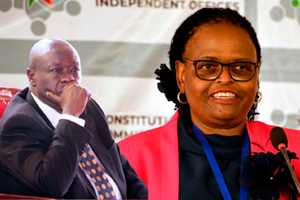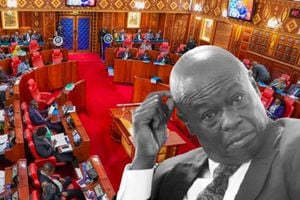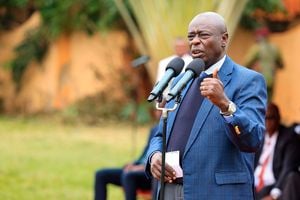Initiative will take you places

Eloquence, a striking confidence of manner and richness of thought are qualities that best describe 22-year old Mariam Bishar, a fourth year Economics student at the University of Nairobi and host of The Great Debaters Contest on KBC Channel 1. PHOTO| DENNIS ONSONGO
What you need to know:
- Mariam envisages a role as a moderator of debates that transcend the youth to larger audiences at the national level.
- “I was very excited when the presidential debates began in 2013. It is an exciting platform that I look forward to hosting in future.”
- She spends her pay on her upkeep, the rest she saves for future investments.
Eloquence, a striking confidence of manner and richness of thought are qualities that best describe 22-year old Mariam Bishar, a fourth year Economics student at the University of Nairobi and host of The Great Debaters Contest on KBC Channel 1.
The programme was launched in 2010 by Jamhuri Peace Foundation in partnership with Arimus Media, the goal to drive conversations by high school students on thematic areas of leadership, governance, technology, climate change and environmental conservation. Discussions take national, continental and global dimensions.
Mariam describes herself as a go-getter, one who enjoys winning an argument and prevailing upon others to view things in her perspective.
While in Form Two at Buruburu Girls High School, back in 2010, Mariam founded a debating club to prepare for the second edition of the debating contest in 2011. In Form Three, she led her school to the contest. Unfortunately, the team did not perform as they had expected. They did not give up though, and made it to the finals in 2012.
“The Aga Khan Academy won the competition, and while my school was disappointed, for me, it was a personal loss. I however took consolation from the fact that an initiative I had driven had reached the highest possible level.”
LEAST EXPECTED DOOR
This would later open a least expected door for Mariam. A year after she completed high school, the organisers of the contest contacted her. Her finesse on the debating podium had impressed them.
“They called to ask if I would be interested to be one of the debate’s host. How could I turn down such an opportunity? I did a screen test and was offered the job in 2013.”
While only four secondary schools took part in the contest’s inaugural year, the forum has grown; by 2016, it had attracted over 700 secondary schools. The debate airs from Monday to Friday.
“To prepare, we hold workshops with teachers and participating students where we teach the students the skills of public speaking, such how to manage their body language, how to project their voice and the ethical issues in debating, such as how to address opponents and what not to say in a debate. It is here that we also introduce the topics that will be debated on, allowing participants time to rehearse.”
Mariam adds: “The Great Debaters Contest promotes the participation of youth in the pursuit for solutions for socio-political and economic challenges facing our society. While these debates are entertaining, they also build participants’ confidence and prepare them for life after school. I am doing this today because the platform built my self-esteem and courage.”
For someone in her final year at university, with lectures to attend, research work to complete and friends to hang out with, Mariam admits that balancing this role with her studies and other personal endeavours is sometimes tough.
“I have to finish all my academic work and other personal activities within the week before travelling on Friday afternoon to the region hosting the debate that weekend. Normally, I prepare for the debate on days when I don’t have lectures or in between lectures, which means I only get to rest during the flights to the venues. But I have discovered that I am more productive when I have a lot on my plate. The pressure has enabled me to responsibly manage and spend my time.”
The best way to measure the impact of the contest and its success, Mariam says, would be to interrogate the current engagements of former participants, pointing out that the debate has directly influenced career paths for some of her former fellow contestants.
“Joel Muuo is a student leader at the University of Nairobi’s institute of diplomacy and international studies, and organises model UN simulations, academic activities where students learn about diplomacy and international relations.
Rodney Wesonga, a student at Jomo Kenyatta University’s school of Law, has participated in moot courts in India and South Africa on human rights issues, where he was also in the judging panel.”
Moot courts are mock or fictional courts in which law students argue imaginary cases as part of their studies.
Mariam’s oratorical prowess has seen her selected as a moderator during the East Africa Business Forum organised by the School of Business at the University of Nairobi in 2016 and a host of the Africa Inuka Leadership Forum organised by Daystar University and Inuka Leadership Trust, besides travelling all over the country to moderate debates. She is interested in media production, and intends to set up her own production house in the near future, to produce online content that “triggers and advances discussions around reforms across the world.”
“I value the power of the media to inform and propagate important discussions. With my skills in economics, I am confident that I have the right combination of features to run a successful and impactful organisation.”
Mariam envisages a role as a moderator of debates that transcend the youth to larger audiences at the national level.
“I was very excited when the presidential debates began in 2013. It is an exciting platform that I look forward to hosting in future.”
She spends her pay on her upkeep, the rest she saves for future investments.




